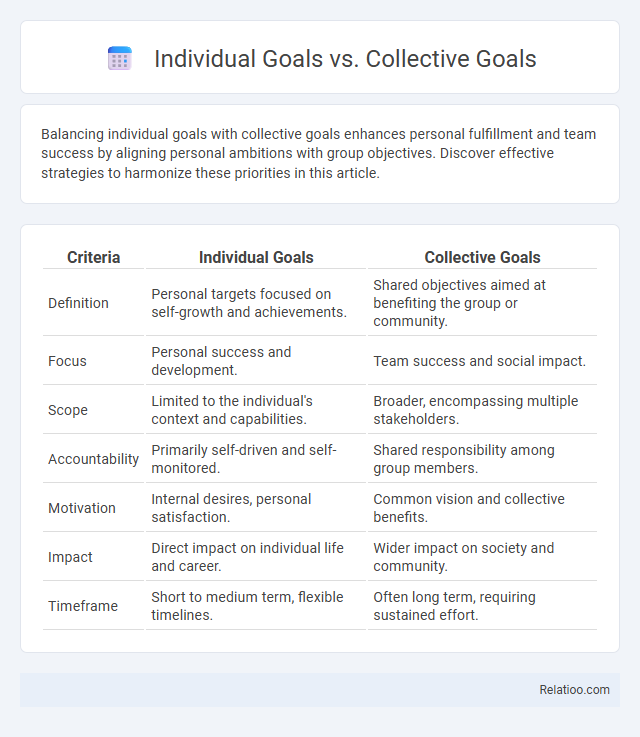Balancing individual goals with collective goals enhances personal fulfillment and team success by aligning personal ambitions with group objectives. Discover effective strategies to harmonize these priorities in this article.
Table of Comparison
| Criteria | Individual Goals | Collective Goals |
|---|---|---|
| Definition | Personal targets focused on self-growth and achievements. | Shared objectives aimed at benefiting the group or community. |
| Focus | Personal success and development. | Team success and social impact. |
| Scope | Limited to the individual's context and capabilities. | Broader, encompassing multiple stakeholders. |
| Accountability | Primarily self-driven and self-monitored. | Shared responsibility among group members. |
| Motivation | Internal desires, personal satisfaction. | Common vision and collective benefits. |
| Impact | Direct impact on individual life and career. | Wider impact on society and community. |
| Timeframe | Short to medium term, flexible timelines. | Often long term, requiring sustained effort. |
Understanding Individual Goals
Understanding individual goals involves recognizing personal aspirations, motivations, and values that drive behavior and decision-making. These goals are often distinct from collective goals, which emphasize shared objectives within groups or communities. Clarifying individual goals enhances self-awareness and supports aligning personal identity with meaningful achievements.
Defining Collective Goals
Collective goals represent shared objectives that unite a group, organization, or community in pursuit of common outcomes, emphasizing collaboration and mutual benefits. Unlike individual goals, which focus on personal achievements, collective goals require aligning diverse identities and interests to foster a sense of belonging and collective identity. Your success in achieving collective goals depends on effective communication, cooperation, and a strong commitment to shared values and vision.
Key Differences between Individual and Collective Goals
Individual goals emphasize personal achievement, autonomy, and self-improvement, focusing on outcomes that enhance individual success or satisfaction. Collective goals prioritize group welfare, cooperation, and shared objectives, aiming to benefit the community or organization as a whole. The key difference lies in motivation and scope: individual goals center on personal identity and aspirations, while collective goals are driven by social identity and the interdependence of group members.
Benefits of Pursuing Individual Goals
Pursuing individual goals fosters personal growth by encouraging self-discipline, creativity, and autonomy, which enhances overall well-being and satisfaction. Individual goal pursuit leads to increased motivation and a stronger sense of purpose, driving success in personal and professional domains. Focusing on personal achievements also contributes to identity formation, solidifying a unique sense of self that supports mental resilience and long-term fulfillment.
Advantages of Focusing on Collective Goals
Focusing on collective goals fosters collaboration and strengthens social bonds, enabling groups to achieve outcomes that surpass individual efforts. Your commitment to shared objectives enhances resource sharing, supports innovation through diverse perspectives, and builds a resilient community identity. Prioritizing collective goals also promotes a sense of belonging and mutual accountability, driving sustained progress and collective well-being.
Challenges in Balancing Both Types of Goals
Balancing individual goals and collective goals poses challenges such as conflicting priorities and resource allocation, where Your personal ambitions might clash with group objectives. Navigating these challenges requires understanding the influence of identity on motivation, as strong identification with a group can shift focus towards collective success at the expense of individual aspirations. Effective management of these dynamics ensures alignment without compromising personal growth or group cohesion.
Impact on Personal and Group Motivation
Individual goals enhance personal motivation by fostering a clear sense of achievement and self-efficacy, which drives persistence and commitment. Collective goals strengthen group motivation through shared purpose and collaboration, creating a supportive environment that boosts overall performance and cohesion. Identity plays a crucial role in aligning individual and collective goals by shaping values and belonging, thereby amplifying motivation at both the personal and group levels.
Strategies for Aligning Individual and Collective Goals
Balancing individual goals with collective objectives requires clear communication and shared vision development. Your strategy should include setting measurable milestones that align personal ambitions with team outcomes, fostering a culture of collaboration and mutual accountability. Utilizing regular feedback loops helps to adjust goals dynamically, ensuring both individual growth and group success remain interconnected.
Real-world Examples and Case Studies
Individual goals often drive personal achievement, exemplified by Elon Musk's pursuit of innovating electric vehicles through Tesla, showcasing a singular vision propelling technological advancement. Collective goals are evident in climate change initiatives like the Paris Agreement, where nations collaborate to reduce global carbon emissions, emphasizing shared responsibility and impact. Identity intersects with these goals, as seen in Indigenous communities advocating for land rights, where cultural preservation shapes both collective ambitions and personal objectives within a socio-political context.
Choosing the Right Approach for Success
Balancing individual goals with collective goals requires aligning personal ambitions with group objectives to foster both personal fulfillment and team success. Prioritizing individual goals without considering the collective can lead to fragmented efforts, while focusing solely on collective goals might suppress personal motivation and creativity. Understanding one's identity and values aids in selecting the right approach, ensuring that success is achieved through synergy between personal and group achievements.

Infographic: Individual Goals vs Collective Goals
 relatioo.com
relatioo.com